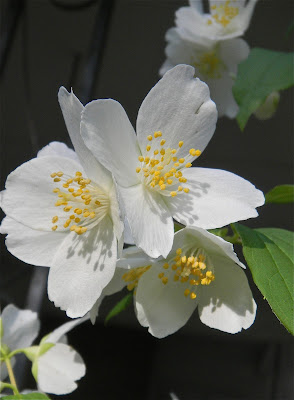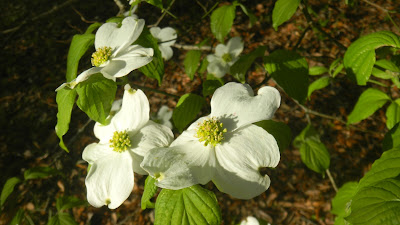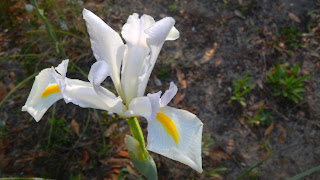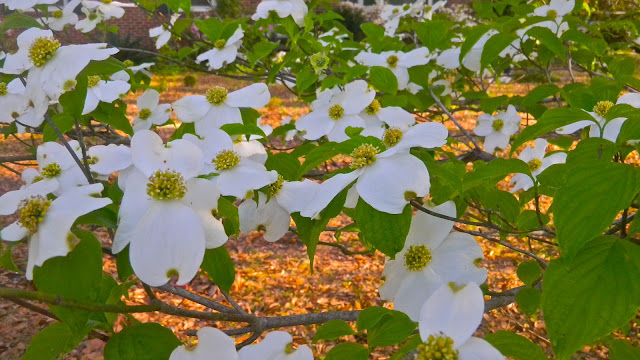 |
| Blossoms cover the tree a young driver once decapitated |
When I visit other people's gardens, I love to hear the stories associated with their plants. Today I'll share with you a few of my own dogwood tales.
 |
| The freebie that bifurcated |
One tree started out more than twenty years ago as volunteer under the live oak in the front yard. Back then I had a front lawn and didn't want to mow over the tiny tree. I dug the volunteer up and moved it to the back yard where I planted it in a depression created, I suspect, when Hurricane Hugo uprooted a tree. At one time this transplanted volunteer looked beautiful. The year my daughter married, a ring of shasta daisies encircled its trunk, but in recent years it began to look bedraggled. I thought it must be diseased. Just over a year ago I talked to the arborist about cutting it down. He convinced me to let him shape it up instead. I'm glad he did.
A few months after I transplanted the volunteer, a mature dogwood close to the street met tragedy on Palm Sunday, when a young driver failed to make a curve and his car sailed through my front yard. The hit-and-run driver decapitated the dogwood. I planned to have the remains cut down but the elderly neighbor across the street loved the tree and sent his yardman over to tend to it. It survived. Now it serves as a wide screen - and blooms like crazy.
One tree is a replacement for a drought-stricken dogwood I had cut down back in the mid-nineties. My dermatologist drove past my house daily on his way downtown and noticed my dead, and then missing, tree. He dropped off a volunteer he'd dug up in his own yard further down the street. It grows in the small flower bed where its predecessor once stood and has survived several subsequent droughts.
 |
| A few blossoms on the tree the dermatologist gave me |
Another dogwood bifurcated. It and a cedar were freebies given away by a governmental agency during the Southeastern Wildlife Exhibition several years ago. It's hard to resist a free tree.
My smallest dogwood is one of perhaps ten the Arbor Day Foundation sent a few years ago in exchange for a small donation. It's the only member of its group to survive - assuming it's still alive. It has barely grown at all and hasn't leafed out yet this year.
And finally, there was one that I particularly loved. Another volunteer. It grew near the house. It looked quite handsome standing between a mass of white-blossomed azaleas and a pittosporum, but quickly grew tall and began to push against an overhanging shingle. The tree doctor said it had to go. I still miss it.
 |
Around here dogwoods in bloom are a sign that spring has arrived
|
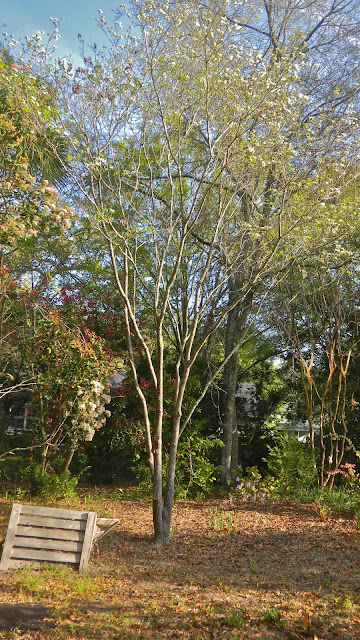 |
| My first dogwood volunteer, much older now, elegant after the arborist shaped it up |
I hope you'll share your own dogwood tales in the comment section below. You don't have to register to comment.
 |
| The morning after a rain storm |
An Unrelated Note: The Volunteer Almond
Earlier this week, while working in my garden, I noticed that a seedling had emerged from the ground approximately a foot away from the almond tree I planted in January of last year. The leaves on the seedling looked much like those on a nearby peach tree. The almond tree grows next to the former site of a compost heap and is dressed with compost. I wondered whether a peach pit had sprouted.
I dug the seedling up and, much to my surprise, found a sprouted almond still attached. The almond certainly didn't come from my tree. The tree didn't produce last year. Apparently the almond was one dropped indoors and relegated to the compost pile.
Did the young almond tree mentor this seedling? Sound crazy? PBS recently aired a program about the influence plants have on each other.
I've transplanted this infant tree to a location where it has more room to grow. But will it survive its first hot, miserable Lowcountry summer?

